SPARES AND SERVICE M HE WORLD'S MARKETS
Page 104
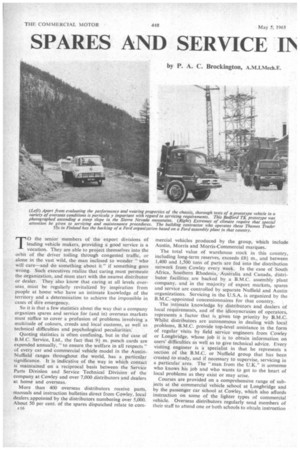
Page 105
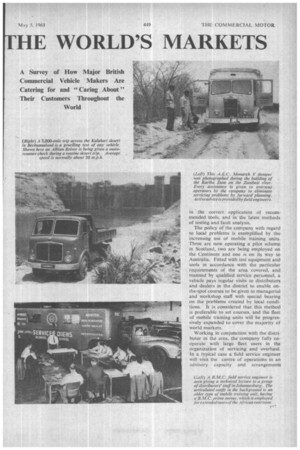
Page 106
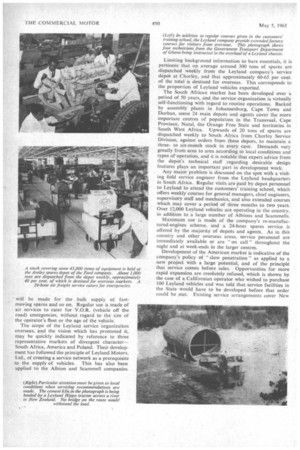
Page 107
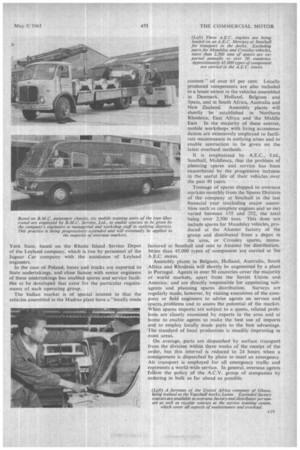
Page 108
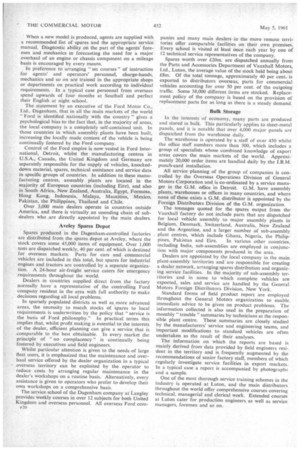
If you've noticed an error in this article please click here to report it so we can fix it.
TO the senior members of the export divisions of leading vehicle makers, providing a good service is a vocation. They are able to project themselves into the orbit of the driver toiling through congested traffic, or .alone in the vast wild, the man inclined to wonder "who will care—and do something about it" if something goes wrong. Such executives realize that caring must permeate the organization, and must start with the nearest distributor or dealer. They also know that caring at all levels overseas_ must be regularly revitalized by inspiration from people at home who have an intimate knowledge of the territory and a determination to achieve the impossible in cases of dire emergency. So it is that a few statistics about the way that a company organizes spares and service for (and in) overseas markets must suffice to cover a profusion of problems involving a multitude of colours, creeds and local customs, as well as technical difficulties and psychological peculiarities. Quoting statistics is often confusing, but in the case of B.M.C. Service, Ltd., the fact that 9/ m. punch cards are expended annually, "to ensure the welfare in all respects" of every car and commercial vehicle model in the AustinNuffield ranges throughout the world, has a particular significance. It is indicative of the way in which contact is maintained on a reciprocal basis between the Service Parts Division and Service Technical Division of the company at Cowley and over 7,000 distributors and dealers at home and overseas. More than 400 overseas distributors receive parts, manuals and instruction bulletins direct from Cowley, local dealers appointed by the distributors numbering over 5,000. About 50 per cent. of the spares dispatched relate to corn mercial vehicles produced by the group, which include Austin, Morris and Morris-Commercial marques. The total value of warehouse stock in this country, including long-term reserves, exceeds f8-1 m., and between 1,400 and 1,500 tons of parts are fed into the distribution network from Cowley every week. In the case of South Africa, Southern Rhodesia, Australia and Canada, distributor facilities are backed by a B.M.C. assembly plant company, and in the majority of export markets, spares and service are controlled by separate Nuffield and Austin organizations. Servicing in the U.S.A. is organized by the B.M.C.-appointed concessionnaires for that country. The intimate knowledge by distributors and dealers of local requirements, and of the idiosyncrasies of operators, represents a factor that is given top priority by B.M.C. Whilst distributors are autonomous in dealing with local problems, B.M.C. provide top-level assistance in the form of regular visits by field service engineers from Cowley or Longbridge, whose job it is to obtain information on users' difficulties as well as to give technical advice. Every visiting engineer is a specialist in that he represents a section of the B.M.C. or Nuffield group that has been created to study, and if necessary to supervise, servicing in a particular area. The "man from the U.K." is someone who knows his job and who wants to get to the heart of local problems as they exist or may arise. Courses are provided on a comprehensive range of subjects at the commercial vehicle school at Longbridge and by the passenger car school at Cowley, which also affords instruction on some of the lighter types of commercial vehicle. Overseas distributors regularly send members of their staff to attend one or both schools to obtain instruction in the correct application of recommended tools, and in the latest methods of testing and fault analysis.
The policy of the company with regard to local problems is exemplified by the increasing use of mobile training units. Three are now operating a pilot scheme in Scotland, two arc being employed on the Continent and one is on its way to Australia. Fitted with test equipment and tools in accordance with the particular requirements of the area covered, and manned by qualified service personnel, a vehicle pays regular visits to distributors
and dealers in the district to enable onthe-spot courses to be given to managerial and workshop staff with special bearing on the problems created by local conditions. It is considered that this method
is preferable to set courses, and the fleet of mobile training units will be progressively expanded to cover the majority of world markets.
Working in conjunction with the distri butor in the area, the company fully cooperate with large fleet users in the organization of servicing and overhaul. In a typical case a field service engineer will visit the centre of operations in an advisory capacity and arrangements will be made for the bulk supply of fastmoving spares and so on. Regular use is made of air services to cater for V.O.R. (vehicle off the road) emergencies, without regard to the size of the operator's fleet or the age of the vehicle.
The scope of the Leyland service organization overseas, and the vision which has promoted it, may be quickly indicated by reference to three representative markets of divergent character— South Africa, America and Poland. Their development has followed the principle of Leyland Motors, Ltd., of creating a service network as a prerequisite to the supply of vehicles. This has also been applied to the Albion and Scammell companies. Limiting background information to bare essentials, it is pertinent that on average around 300 tons of spares are dispatched weekly from the Leyland company's service depot at Chorley, and that approximately 60-65 per cent. of the total is destined for overseas. This corresponds to the proportion of Leyland vehicles exported.
The South African market has been developed over a period of 50 years, and the service organization is virtually self-functioning with regard to routine operations. Backed by assembly plants in Johannesburg, Cape Town and Durban, some 24 main depots and agents cover the more important centres of population in the Transvaal, Cape Province, Natal, the Orange Free State and territories in South West Africa. Upwards of 20 tons of spares are dispatched weekly to South Africa from Chorley Service Division, against orders from these depots, to maintain a threeto six-month stock in every case. Demands vary greatly from area to area according to local conditions and types of-operation, and it is notable that expert advice from the depot's technical staff regarding desirable design features plays an important part in development work.
Any major problem is discussed on the spot with a visiting field service engineer from the Leyland headquarters in South Africa. Regular visits are paid by depot personnel to Leyland to attend the customers' training school, which offers weekly courses for general managers, chief engineers, supervisory staff and mechanics, and also extended courses which may cover a period of three months to two years. Over 12,000 Leyland vehicles are operating in the country, in addition to a large number of Albions and Scammells.
Maximum use is made of the company's re-manufactured-engines scheme, and a 24-hour spares service is offered by the majority of depots and agents. As in this country and other overseas areas, service personnel are immediately available or are "on call" throughout the night and at week-ends in the larger centres.
Development of the American market is indicative of the company's policy of "slow penetration" as applied to a new project with a large potential, and of the principle that service comes before sales. Opportunities for more rapid expansion are resolutely refused, which is shown by the case of a Californian operator who wished to purchase 100 Leyland vehicles and was told that service facilities in the State would have to be developed before that order could be met. Existing service arrangements cover New York State, based on the Rhode Island Service Depot of the Leyland company, which is run by personnel of the Jaguar Car company with the assistance of Leyland engineers.
In the case of Poland, buses and trucks are exported to State undertakings, and close liaison with senior engineers of these undertakings has enabled spares and service facilities to be developed that cater for the particular requirements of each operating group.
The Indian market is of special interest in that the vehicles assembled in the Madras plant have a -locally made
content" of over 65 per cent. Locally produced components are also included to a lesser extent in the vehicles assembled in Denmark, Holland, Belgium and Spain, and in South Africa, Australia and New Zealand. Assembly plants will shortly be established in Northern Rhodesia, East Africa and the Middle East. In the majority of these centres, mobile workshops with living accommodation are extensively employed to facilitate maintenance in outlying areas and to enable instruction to be given on the latest overhaul methods.
It is emphasized by A.E.C., Ltd., Southall, Middlesex, that the problem of planning spares and service has 'been exacerbated by the progressive increase in the useful life of their vehicles over the past 40 years.
Tonnage of spares shipped to overseas markets monthly from the Spares Division of the company at Southall in the last financial year (excluding major assemblies such as complete engines and so on) varied between 155 and 252, the total being over 2,500 tons. This does not include spares for Maudslay vehicles, produced at the Alcester factory of the group and distributed from a depot in the area, or Crossley spares, manufactured at Southall and sent to Alcester for distribution. Mare than 45,000 types of component are carried at the A.E.C. stores.
Assembly plants in Belgium, Holland, Australia, South Africa and Rhodesia will shortly be augmented by a plant in Portugal. Agents in over 50 countries cover the majority of world markets, apart from the Soviet Union and America; and are directly responsible for appointing subagents and planning spares distribution. Surveys are regularly made, however, by visiting executives of the company or field engineers to advise agents on service and spares. problems and to assess the potential of the market. When spares imports are subject to a quota, related problems are closely examined by experts in the area and at home to enable agents to make the best use of imports and to employ locally made parts to the best advantage. The standard of local production is steadily improving in most areas.
On average, parts are dispatched by surface transport from the division within three weeks of the receipt of the order, but this interval is reduced to 24 hours when a consignment is dispatched by Plane to meet an emergency. Air transport is employed for all emergency traffic and represents a world-wide service. In general, overseas agents follow the policy of the A.C.V. group of companies by ordering in bulk as far ahead as possible. When a new model is produced, agents are supplied with a recommended list of spares and the appropriate service manual. Diagnostic ability on the part of the agents' foremen and mechanics in forecasting the need for a major overhaul of an engine or chassis component on a mileage basis is encouraged by every means.
In preference to arranging "set courses" of instruction for agents' and operators' personnel, charge-hands, mechanics and so on are trained in the appropriate shops or departments on practical work according to individual requirements. In a typical case personnel from overseas spend upwards of four months at Southall and perfect their English at night school.
The statement by an executive of the Ford Motor Co., Ltd., Dagenham, that in all the main markets of the world "Ford is identified nationally with the country" gives a psychological bias to the fact that, in the majority of areas, the local company is a completely self-contained unit. In those countries in which assembly plants have been built, increasing the locally made content of the vehicle is being continually fostered by the Ford company.
Control of the Ford empire is now vested in Ford International, Detroit, whilst the manufacturing centres in U.S.A., Canada, the United Kingdom and Germany are separately responsible for the supply of vehicles, knockeddown material, spares, technical assistance and service data in specific groups of countries. In addition to these manufacturing centres, assembly plants are located in the majority of European countries (including Eire), and also in South Africa, New Zealand, Australia, Egypt, Formosa, Hong Kong, Indonesia, Malaya, Mauritius, Mexico, Pakistan, the Philippines, Thailand and Chile.
Over 3,000 main dealers operate in countries outside America, and there is virtually an unending chain of subdealers who are directly appointed by the main dealers.
Aveley Spares Depot
Spares produced in the Dagenham-controlled factories are distributed from the spares depot at Aveley, where the stock covers some 45,000 items of equipment. Over 1,000 tons are dispatched weekly, 40 per cent. of which is destined for overseas markets. Parts for cars and commercial vehicles are included in this total, but spares for industrial engines and tractors are controlled by a separate organization. A 24-hour air-freight service caters for emergency requirements throughout the world.
Dealers in countries supplied direct from the factory normally have a representative of the controlling Ford company resident in the area with full authority to make decisions regarding all local problems.
In sparsely populated districts as well as more advanced areas, the necessity to match stocks of spares to local requirements is underwritten by the policy that "service is the basis of Ford philosophy." In practical terms this implies that, whilst profit making is essential to the interests of the dealer, efficient planning can give a service that is comparable to the best obtainable. In every market the principle of "no complacency" is continually being fostered by executives and field engineers.
Whilst particular attention is given to the needs of large fleet users, it is emphasized that the maintenance and overhaul service offered by the dealer organization in a typical overseas territory can be exploited by the operator to reduce costs by arranging regular maintenance in the dealer's workshops on a routine basis. Alternatively, every assistance is given to operators who prefer to develop their own workshops on a comprehensive basis.
The service school of the Dagenham company at Langley provides weekly courses in over 12 subjects for both United Kingdom and overseas personnel. All overseas Ford corn panics and many main dealers in the more remote territories offer comparable facilities on their own premises. Every school is visited at least once each year by one of 12 technical service representatives of the company.
Spares worth over £20m. are dispatched annually from the Parts and Accessories Department of Vauxhall Motors, Ltd., Luton, the average value of the stock held being about £8m. Of the total tonnage, approximately 40 per cent. is exported to distributors overseas, parts for commercial vehicles accounting for over 50 per cent. of the outgoing traffic. Some 38,000 different items are stocked. Replacement policy of the company is based on the provision of replacement parts for as long as there is a steady demand.
Bulk Storage
In the interests of economy, many parts are produced and stored in bulk. This particularly applies to sheet-metal panels, and it is notable that over 4,000 major panels are dispatched from the warehouse daily.
The warehouse is operated by a staff of over 450 whilst the office staff numbers more than 300, which includes a group of specialists whose combined knowledge of export areas covers the main markets of the world. Approximately 20,000 order items are handled daily by the I.B.M. punch-card installation.
All service planning of the group of companies is controlled by the Overseas Operations Division of General Motors Corporation and is co-ordinated by a service manager in the G.M. office in Detroit. G.M. have assembly plants, warehouses or offices in many countries, and where none of these exists a G.M. distributor is appointed by the Foreign Distributors Division of the G.M. organization.
The tonnages quoted for the spares output from the Vauxhall factory do not include parts that are dispatched for local vehicle assembly to major assembly plants in Belgium, Denmark, Switzerland, Australia, New Zealand and the Argentine, and a larger number of sub-assembly plant centres, which include Ghana, Nigeria, the Philip pines, Pakistan and Eire. In various other countries, including India, sub-assemblies are employed in conjunction with major components produced in the area.
Dealers are appointed by the local company in the main plant-assembly territories and are responsible for creating a dealer network, arranging spares distribution and organizing service facilities. In the majority of sub-assembly territories and in some to which complete vehicles are exported, sales and service are handled by the General Motors Foreign Distributors Division, New York.
Standard forms of field product report are employed throughout the General Motors organization to enable immediate advice to be given on product problems. The information collected is also used in the preparation of monthly "trouble " summaries by technicians at the responsible plant centre. These summaries are closely studied by the manufacturers' service and engineering teams, and important modifications to standard vehicles are often undertaken as the result of their analyses.
The information on which the reports are based is mainly derived from data provided by field engineers resident in the territory and is frequently augmented by the recommendations of senior factory staff, members of which regularly investigate service facilities in export markets. In a typical case a report is accompanied by photographs and a sample.
One of the most thorough service training schemes in the industry is operated at Luton, and the main distributors throughout the world offer comprehensive courses covering technical, managerial and clerical work. Extended courses at Luton cater for production engineers as well as service managers, foremen and so on.








































































































































































































































































